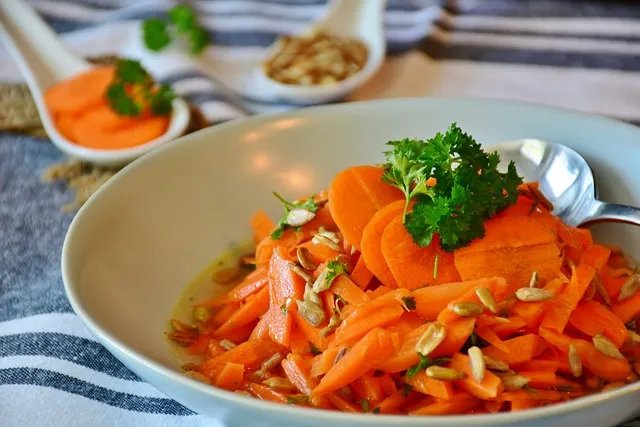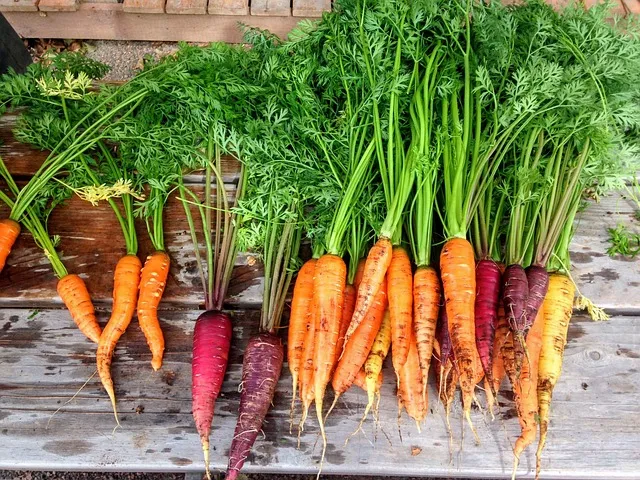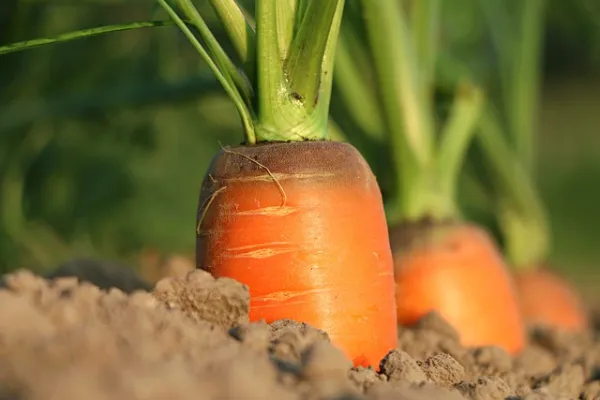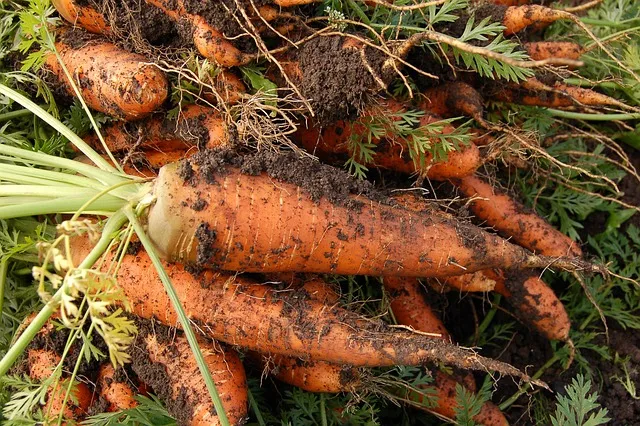
Carrots are one of the most popular vegetables worldwide! Not only are they delicious and versatile, but they are also packed with nutrition and are incredibly fun to learn about. From their rich history to their unique nutritional benefits, carrots have plenty of interesting facts to spark your curiosity. Here are some fun facts about carrots that will surprise you!
Carrots: Nature’s Superfood
Carrots are one of the most nutrient-dense and versatile vegetables that can be found in many kitchens. Not only are they a great source of essential vitamins and minerals, they are also a powerhouse of antioxidants, dietary fiber, and carotenoids, which all contribute to a healthy diet and lifestyle.

Carrots have a long history of being a beneficial part of the human diet, with evidence of them being consumed as early as the 10th century BC. They were initially used for their medicinal properties, as they were believed to help with vision and other health-related issues. Today, carrots are widely consumed not only for their medicinal benefits, but also for their flavor and texture.
Carrots are a great source of essential vitamins and minerals, such as Vitamin A, Vitamin C, Vitamin K, manganese, potassium, and iron. Vitamin A is important for eye health and vision, and is also important for a healthy immune system. Vitamin C and Vitamin K are both essential for bone health and proper blood clotting. Manganese is important for energy production, while potassium helps to maintain proper fluid balance in the body. Iron is important for red blood cell production and overall energy levels.
In addition to the essential vitamins and minerals, carrots also contain many powerful antioxidants, which help to protect the body from disease and aging. Beta-carotene is one of the most well-known antioxidants found in carrots, and is responsible for giving carrots their distinctive orange color. Beta-carotene is converted into Vitamin A in the body, and helps to reduce inflammation, reduce the risk of certain cancers, and protect the eyes from age-related vision problems.
Carrots are also a great source of dietary fiber, which helps to promote healthy digestion and aid in weight management. Dietary fiber helps to slow the absorption of sugar into the bloodstream, preventing sugar spikes that can lead to fatigue and mood swings. Fiber can also help to lower cholesterol levels and reduce the risk of heart disease.
Carrots are a truly remarkable superfood that can be easily incorporated into any diet. Whether you eat them raw, cooked, or juiced, carrots are a great way to get the essential vitamins and minerals your body needs, as well as powerful antioxidants that can help to protect your body from disease and aging. So make sure to include carrots in your diet today for a nutritious and delicious way to stay healthy.
10 Fun Facts About Carrots

Carrots are a familiar and beloved vegetable, often associated with good nutrition and health. In recent years, the popularity of carrots has grown due to their use in a variety of recipes and dishes. Despite this level of familiarity, there are 10 fun facts about carrots that many people may not be aware of.
First, carrots are not always orange. While this is the most common hue, carrots can also be found in white, yellow, red, and purple varieties.
Second, carrots have been around for a long time. In fact, carrots have been cultivated for over 5,000 years, originating in Afghanistan.
Third, carrots are actually related to the parsnip, and both are part of the Apiaceae family.
Fourth, carrots contain a variety of vitamins and minerals, including Vitamin A, Vitamin C, and Vitamin K. They are also a good source of dietary fiber and potassium.
Fifth, carrots can help improve eyesight. This is due to the high content of Vitamin A, which helps to maintain and improve vision.
Sixth, carrots can help reduce the risk of cancer. Carrots contain carotenoids, which have been linked to a reduced risk of certain types of cancers, including lung and prostate cancer.
Seventh, carrots are used in a variety of beauty products. This is due to their antioxidant properties, which help to reduce the appearance of wrinkles and other signs of aging.
Eighth, carrots can also be used to make wine. The process involves fermenting carrots with yeast and other ingredients to create a sweet, fragrant beverage.
Ninth, carrots can help to reduce cholesterol. The dietary fiber in carrots helps to bind cholesterol and eliminate it from the body.
Finally, carrots can be used as a natural sweetener in baking. Carrot juice or grated carrots can be used in place of sugar or other sweeteners in recipes.
These are 10 fun facts about carrots. With such a long history of cultivation and such a wide variety of uses, carrots are a truly remarkable vegetable.
Carrots: A Nutritional Powerhouse

Carrots are a nutritional powerhouse packed with essential vitamins and minerals. A one-cup serving of carrots provides over 200% of the recommended daily intake of vitamin A and 10% of the recommended daily intake of vitamin C. This nutrient-dense vegetable is also an excellent source of dietary fiber, potassium, iron, and magnesium.
The benefits of carrots don’t end there. Carrots contain several compounds that have been studied for their potential cancer-fighting properties. They are also high in carotenoids, which are natural compounds that can help protect your vision.
Carrots are easy to incorporate into your diet. They can be eaten raw or cooked in a variety of ways, including steamed, boiled, roasted, and stir-fried. You can also add them to salads, soups, and stews. Carrot juice is another great way to get your daily dose of this nutritious vegetable.
By adding carrots to your diet, you can be sure you are getting plenty of essential vitamins and minerals. With their cancer-fighting compounds and eye-protecting carotenoids, carrots are a nutritional powerhouse that can help you stay healthy and strong.
The History of Carrots: From Wild Roots to Cultivated Vegetables

Carrots are a widely popular vegetable today, enjoyed in a variety of dishes around the world. But how did this popular vegetable come to be? The history of carrots trace back to ancient times, when wild roots were consumed by humans.
The ancient Greeks and Romans are believed to have first cultivated carrots, but it was the Arabs who developed the vegetable into the edible root we know today. Wild carrots were small and bitter, with a woody texture, but the Arabs developed a sweeter, smoother, and larger variety. These carrots were brought to India and then to Europe by the Arabs during the Middle Ages.
During the 16th century, the carrot spread across Europe, and by the 17th century, Dutch farmers began to cultivate carrots of all colors, including purple, red, yellow, and white. From Europe, the carrot spread to the Americas, where colonists began to cultivate them.
By the 18th century, carrots had become a popular vegetable in the United States. They were especially popular in the Northeast, where the climate is ideal for carrot cultivation. Today, carrots are grown all over the world and are enjoyed in many different dishes.
From their humble beginnings as wild roots, carrots have become a staple of many diets. This vegetable has come a long way since its early days and is now enjoyed by millions of people around the world.
The Many Uses of Carrots: From Soup to Smoothies
Carrots are an incredibly versatile vegetable that can be used in a variety of dishes, from soups to smoothies. Rich in beta-carotene, vitamins, and minerals, carrots are a powerhouse of nutrition. Here, we will explore some of the many uses of carrots, and how to incorporate them into your diet.
Soups are a great way to incorporate carrots into your diet. Carrots add a sweet, earthy flavor to any soup, and they are packed with vitamins and minerals. Try adding some diced carrots to your favorite recipe for a delicious and nutritious soup. You can also try making carrot soup from scratch. Simply begin by sautéing some onion and garlic in a pot, then add some diced carrots and broth. Simmer for a few minutes, then blend the soup until it reaches a smooth consistency.

Vegetable sides are also a great way to use carrots. Roasted carrots are a delicious and easy side dish. All you have to do is preheat your oven to 425°F, toss some diced carrots in olive oil, season with salt and pepper, and roast for 20 minutes. You can also try adding some other herbs and spices for extra flavor.
Carrots can also be used to make smoothies. Start by blending some frozen bananas, carrots, and almond milk. You can also add some nut butter or Greek yogurt for extra protein. This smoothie is delicious and full of nutrition.
Overall, carrots are a surprisingly versatile vegetable. From soups to smoothies, carrots can be used in a variety of dishes, all while providing essential vitamins and minerals. So the next time you’re at the grocery store, pick up a bunch of carrots and get creative in the kitchen!
Carrots have been a staple of diets worldwide for centuries and are a great source of nutrition. They are low in calories, high in vitamins, minerals, and fibers, and contain powerful antioxidants. Carrots are also an excellent source of beta-carotene, which is converted to vitamin A in the body and is essential for healthy eyesight. Eating carrots regularly can help improve overall health and wellbeing, and they make a great snack for both adults and children alike.






Leave a Reply